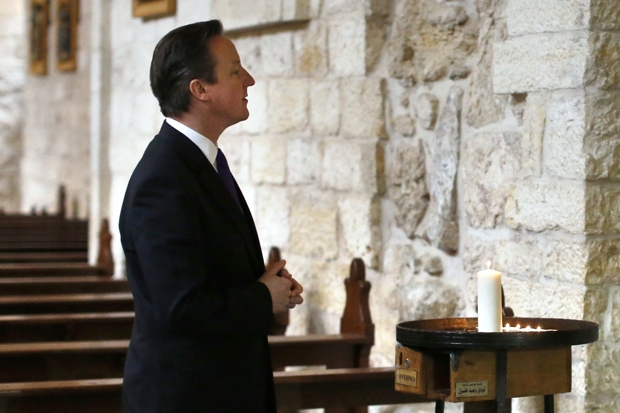Last week, David Cameron surprised a number of people when, during a pre-Easter gathering at Downing Street, he spoke about religion. Not religion in general, the all-faiths-and-none diversity-speak of the political class, but his own Christian faith. James Forsyth writes about the implications in this week’s magazine.
But what was most surprising was that the prime minister went further by saying that ‘our religion’ is the most persecuted in the world and that ‘I hope we can do more to raise the profile of the persecution of Christians’. He added: ‘We should stand up against the persecution of Christians and other religious groups wherever and whenever we can, and should be unashamed in doing so.’
This is quite a development. The prime minister has on a number of occasions spoken about Islamophobia, and about homophobia, he’s given his opinion on the price of England football tops and Nigella Lawson. But on one of the greatest events of our age – the persecution of Christians – he and his senior colleagues have had nothing to say.
By the best calculation, some 7-8,000 Christians are killed for their faith each year. But aside from China and North Korea, the epicentre of persecution is the greater Middle East, and it is a story in which Britain has been not just negligent but complicit.
This Easter the prime minister, like most of us, will be with his family, and we all wish him some peace and relaxation. For the Christians of Homs it will be a very different story. The ancient city, which dates back to 2300BC and was the site of a great chariot battle between the Pharaoh and the Hittites, was home to more than 50,000 Christians at the start of the Syrian civil war in 2011. Today there are an estimated two-dozen left in the old city.
Last week a 75-year-old Dutch priest, Fr Franz van der Lugt, was murdered in the besieged rebel-controlled old city, becoming the latest Christian martyr in this bloodstained region; one theory is that Fr Franz was shot by an Islamist militia as punishment for helping a group of 20 people to cross the lines. Fr Franz, a Jesuit like Pope Francis, had spent 50 years in that beautiful country and had endured Homs’s three-year siege, choosing to stay when he could have left.
Across the land of St Paul, Christian communities have been scattered by Islamist militias. Jihadis seized the ancient city of Ma’loula in September; kidnapping 12 nuns and reportedly executing three Christians who refused to renounce their faith, just weeks after David Cameron and Barack Obama had tried to intervene military on the side of the rebels. In November, dozens of bodies turned up in the Christian village of Sadad after al-Qaeda-linked rebels had briefly occupied it.
Next door in Iraq a Christian population of 1.5 million in 1991 is not much more than a tenth of that figure today, thanks to the work of those devout Christians George W Bush and Tony Blair. Last spring, Iraq’s patriarch declared that the country had just 57 churches left, down from 300 before the invasion; 70 churches having been bombed in that period. And while a total of 4,487 US and 179 British troops laid down their lives for Iraqi freedom, America has presided over the Islamisation of the country; the Iraqi constitution of 2005 incorporates elements of discriminatory Sharia law, to the distress of the country’s many ancient minorities.
Despite the Iraq disaster the British and American governments were keen to back the overthrow of President Bashar Assad right from the start. As with Iraq, anyone could have seen that, with the removal of the Assad regime, the country’s religious minorities would be extremely vulnerable to attack from Sunni extremists. And so in early 2012 militants expelled 90 per cent of Homs’s Christians; Salafists going door-to-door ‘ordering Christians to flee, without giving them the chance to take their belongings’; in April 2012 no Easter services were held in that city for the first time in centuries. Last September, a leading Syrian churchman stated that a third of the country’s pre-war Christian population of 1.75 million had now fled their homes.
And yet the British government has barely blinked. When Russia introduced a law banning the promotion of homosexuality, David Cameron met Stephen Fry for a drink to discuss Britain’s response. When the most prominent Christian leader in Syria, Patriarch Gregorios III, came to England to talk about persecution last September, he was offered only time with a junior foreign office minister. Okay, he doesn’t have so many Twitter followers; but surely a Christian prime minister could have found time.
The American government has been even worse. According to Nina Shea of the Center for Religious Freedom, the US government is ‘both ignorant and naïve’ about Islamism, and is willfully deceiving itself. In Persecuted: The Global Assault on Christians, Shea and co-authors Lela Gilbert and Paul Marshall point out that after the October 31, 2010 Baghdad church massacre, in which 52 people were murdered, the White House issued a statement that made no mention of where the attacks took place, nor the religion of the victims. This is described as ‘the watershed moment for Iraqi Christians’ who now realised the West would not help.
After the October 2011 Maspero massacre, when the Egyptian army opened fire on unarmed Christians, killing 28, the White House stated: ‘Now is a time for restraint on all sides so that Egyptians can move forward together to forge a strong and united Egypt.’ There was no mention of the identity of the killers and victims or that there was even guilt to be apportioned.
An even odder illustration of US government thinking came on Easter Day 2012, when 39 civilians were slaughtered by a suicide bomb at a Protestant church in Kaduna, northern Nigeria. That day Secretary Hillary Clinton issued just one press release, on anti-Gypsy prejudice in Europe, stating that ‘today we celebrate the history, impact and culture of Romani people’.
As for the media, BBC news coverage of anti-Christian violence is very sparse; the September 2013 All Saints church massacre in Peshawar, in which 78 people, including 34 women and seven children were murdered, received two minutes on the Today programme, but was not even mentioned on BBC television news the next day.
Pakistan is Britain’s largest aid recipient, the country given £500m a year for various projects, yet this goes into their coffers without a word of protest over their treatment of minorities, not just Christians but unorthodox Islamic sects such as the Ahmadiyya; recently a 72-year-old British Ahmadi doctor was arrested in Pakistan on blasphemy charges after quoting an extract from the Koran.
In the government only Baroness Warsi, a Muslim, has raised the issue of Christian persecution, yet her recently devised advisory group on persecution might give the impression that the overwhelming majority of the victims of persecution are Muslim.
As well as representatives from Liberty, Amnesty and the British Humanist Association, the group includes Tariq Ramadan, a Swiss-Egyptian academic who has allegedly expressed admiration for hardline cleric Yusuf al Qaradawi; there is just one Christian representative among the 15, while Bishop Michael Nazir-Ali, the country’s leading expert on religious persecution in Pakistan, was not even asked.
Why should Britain care? Even if we have no moral obligation, from a purely self-interested point of view Christians have long been a bridge between east and west, and helped to spread western ideas – significantly it was a Lebanese Christian, Charles Malik, who helped draft the UN Declaration on Human Rights. A Middle East without its minorities would be a more hostile place for us, and a worse place for the people there.
If David Cameron was serious about his faith, he would make this a foreign policy priority, and undo some of the terrible legacy of his predecessor, Tony Blair. Otherwise there may not be many more Easters left to celebrate in the faith’s cradle.
Ed West is the author of The Silence of Our Friends.







Comments